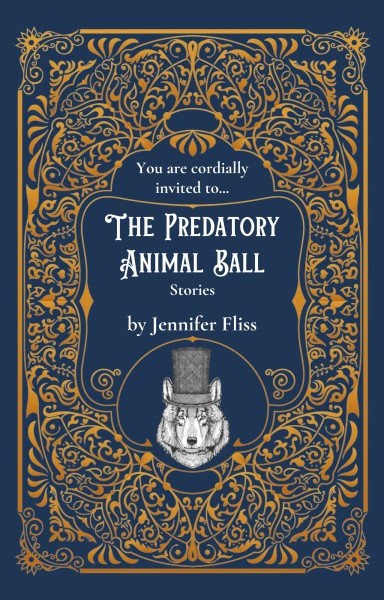
Reviewed by Beret Olsen
I once saw a pigeon on Third Avenue hobbling around with a needle sticking out of its eye. Not a small needle either, a long one, about four inches. It swayed like a lightning rod in the wind as the pigeon bobbed its head, talking in its pigeon language. Its I wish I was a dove language. The wrong color language. The wrong place at the wrong time language.
— from “Pigeons”
So begins Jennifer Fliss’s debut collection, The Predatory Animal Ball (OKD Books, 2021). Aptly titled, this wild, reeling book holds forty flash stories along with an abundance of absurdity, trauma, and nail biting, some mold, and above all, compassion. Fliss writes with great tenderness for her main characters, a deep understanding and acceptance of their confusion, bizarre behavior, and bad decisions. A diabetic man eats a bag of cookies. A woman walks into a fire zone, hoping to get a milkshake. A teenaged girl in a crop top quietly awaits the unknown in a burlap bag. Alienated and dysfunctional couples stay together without hope of reconciliation: “Eventually we sleep in different rooms and love the walls the way we once loved each other. He only looks at me through his peripheral vision…I also only look at his shadows” (from “Watercolor Felon”).
Normally I read stories as organized by author and editor, but one glance at the table of contents and I could not make myself do so: “Edward Scissorhands Takes Up Scrapbooking.” “Infidelity Love Suit.” “Swan Songs Are Just Human Songs with Feathers.” Though I meandered at will, I made the complete journey more than once, finding new perspectives on life as a human throughout. This, despite the fact that a narrator might be a gargoyle. Or a boat. The arc might take a fantastical turn. One woman rides beside herself on the subway. Another opens her mouth and lets loose sea urchins and anemones, kelp and a choir. Fliss takes obvious pleasure in the freedom fiction permits, so expect the unexpected.
The playfulness of plot and structure belies the content as well as the impact, however. Underneath these short fictions runs an overwhelming current of grief.
“Forever” pulls back the curtain on a man and a woman coming to terms with a miscarriage. She scrolls endlessly through social media: “Death, destruction, violence, bigotry, death again…My thumb tires from brushing over all the corpses.” She pauses momentarily to post happy emojis under a friend’s baby announcement. He collects lint from the dryer and rearranges beach glass in the windowsill, “the color of lakes, the color of envy.” As he starts tucking the lint into envelopes and mailing it to B-list friends and family, it is hard to define what moved me so about his strange task. Perhaps it has something to do with lint itself, soft clouds of tiny hairs and skin particles, fabric fibers and bits of used tissues, all parts of ourselves and our lives that are left behind. Lived without.
In “What Goes with Us,” the narrator first attends to her loved one’s slow decline toward death with a microscopic focus on the minutia of it. Over time, this becomes unsustainable; she can no longer pay attention to every second, feel every feeling, or witness every incremental change. Is it even possible to know the exact moment life ends? Then, in death’s aftermath, the narrator’s attention returns to small details—an old library book, a fingernail—with which she becomes obsessed. What Fliss taps into so well is human irrationality in the face of primal, incomprehensible loss and trauma. Who is to say that a more measured, predictable response is more reasonable?
As I page through my copy of the book, I see I went a little nuts with the highlighter. Many sentences made me pause and reread, just to savor and soak them in: “You’re already partially made of ice,” Fliss writes in “The Great Bear, “frozen so long ago that, if they drilled, they’d find the fossils of wooly mammoths.” Later in the same story, “a laugh pierces the air—one of those animal guffaws that comes from a man who probably drinks a lot, was football captain, has two daughters with long hair, and bitches about socialism.” In hindsight, stepping out of the text now and then may have been a reflexive impulse to help mitigate the blow of some hefty content. Whatever the reason, it’s been a delight to sift and study the author’s many perfect moments.
Like the pigeon’s, Jennifer Fliss’s language is difficult to classify. She allows her ideas and narratives to travel between conscious and unconscious, reality and absurdity, then weaves them into the strange shapes of dreams—that is, with a logic that defies reason. Yet the stories in this collection make sense in the way that they don’t. Ultimately, Fliss has discovered a profound way to parse the impact of shock and grief on our lives.
The Predatory Animal Ball by Jennifer Fliss is available from OKD Books.
________________________
 Beret Olsen is a writer, a photographer, and the photo editor for 100 Word Story. Her art, essays, and fiction have appeared in publications including First Class Lit; Flash: The International Short-Short Story Magazine; the Masters Review; and her blog, Bad Parenting 101.
Beret Olsen is a writer, a photographer, and the photo editor for 100 Word Story. Her art, essays, and fiction have appeared in publications including First Class Lit; Flash: The International Short-Short Story Magazine; the Masters Review; and her blog, Bad Parenting 101.

 The SmokeLong Grand Micro Contest (The Mikey) is now an annual competition celebrating and compensating the best micro fiction and nonfiction online.
The SmokeLong Grand Micro Contest (The Mikey) is now an annual competition celebrating and compensating the best micro fiction and nonfiction online.